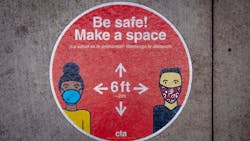In March 2020, I remember commenting to colleagues on a Monday how concern surrounding the novel coronavirus – we didn’t have the COVID-19 name yet – seemed to be escalating quickly. We discussed reports that our state’s governor would issue a shelter in place order on Wednesday and by Friday, we were making final dashes to the grocery store to stock up on essentials and trying to figure out what homeschooling while working full time would look like.
We’ve all made it through a year operating in crisis mode. The playing field we all thought we were used to was constantly shifting under our feet. This uncertainty delivered more than its fair share of challenges and frustrations.
An environment with so many unknowns also seemed to be one that encouraged innovation. Mass Transit covered pilot programs during the past year that extended beyond mobility options to include new cleaning protocols, air sanitization systems, coatings designed to repel and neutralize germs and many others.
We covered the supply side’s pivot to produce additional PPE for transit customers, as well as others in their communities. The new products covered in the past year include stronger HVAC systems, new signage to promote physical distancing and new seats with antimicrobial properties built in.
Services had to be reimagined. Could any of us envision a year ago that transit agencies would be partnering to deliver food to people rather than people to destinations? Or that new and expanded service would include locations where vaccinations would be administered?
Perhaps the most gratifying realization to develop this year is the widespread belief that transit is essential. We all read and shared Jarrett Walker’s “In a Pandemic, We’re All ‘Transit Dependent’” in CityLab last April that was direct in its summation of transit’s value during this health crisis, “The goal of transit, right now, is not competing for riders nor providing a social service. It is helping prevent the collapse of civilization.”
The refrain concerning the essential nature of transit started at the local level and grew. Support for this belief can be found in small gestures from the past year, such as that of Ms. Virginia Payne’s kindergarten class who drew pictures for bus drivers in their Denver neighborhood last spring. A Denver Regional Transportation District blog detailing the class effort quoted a student who said she wanted to help drivers because “they do a good job.”
This support also extends to the halls of Congress, where three emergency relief packages provided the industry with a combined $69.5 billion in emergency funds to help shore up revenue losses brought on by the pandemic.
Transit still faces many unknowns as it charts a path toward recovery, but work continues throughout the industry to develop a future that is stronger, more resilient and just as essential.
About the Author

Mischa Wanek-Libman
Group Editorial Director
Mischa Wanek-Libman is director of communications with Transdev North America. She has more than 20 years of experience working in the transportation industry covering construction projects, engineering challenges, transit and rail operations and best practices.
Wanek-Libman has held top editorial positions at freight rail and public transportation business-to-business publications including as editor-in-chief and editorial director of Mass Transit from 2018-2024. She has been recognized for editorial excellence through her individual work, as well as for collaborative content.
She is an active member of the American Public Transportation Association's Marketing and Communications Committee and served 14 years as a Board Observer on the National Railroad Construction and Maintenance Association (NRC) Board of Directors.
She is a graduate of Drake University in Des Moines, Iowa, where she earned a Bachelor of Arts degree in Journalism and Mass Communication.
